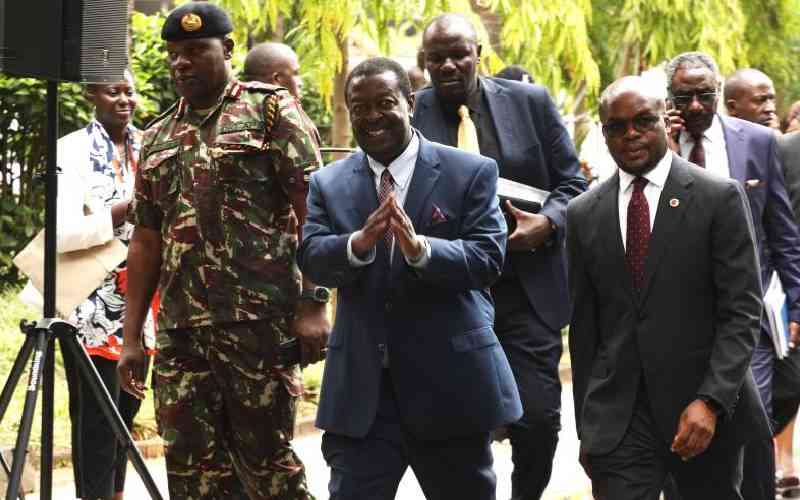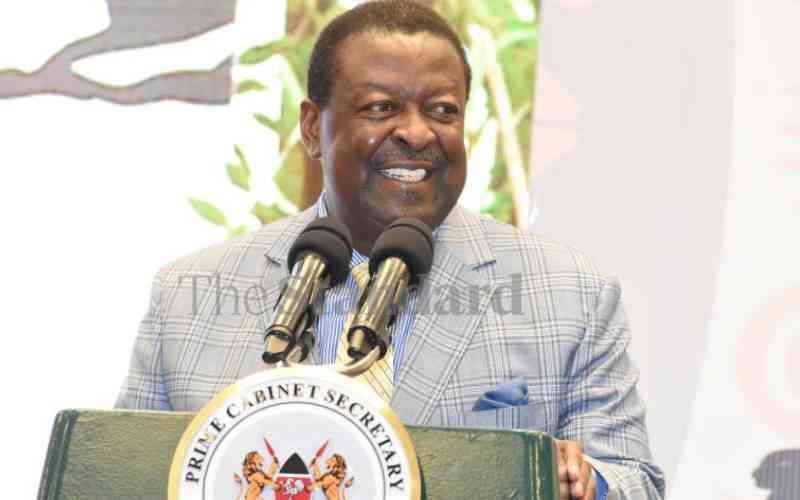As the country prepares for a fresh election, main political parties have been compelled to go back to the drawing board. At things stand now, it is clear that the National Super Alliance's (NASA) ‘No Reforms, No Elections’ narrative calling for the ejection of Independent Electoral and Boundaries Commission (IEBC) CEO Ezra Chiloba is not going to end soon.
The narrative attracts a sufficient amount of disinformation that will characterise the October 17 election as a People vs IEBC contest. Meanwhile, questions are also emerging on whether NASA has consolidated and ring-fenced their bases against apathy and the Jubilee Party charm offensive.
Laundered image
For Jubilee, have they laundered their image in the aftermath of sustained attacks on the Judiciary? Have they acquired a national and inclusive appeal besides the recent pilgrimages to State House by various ethnic communities?
Any political movement keen on maintaining voter influence must master the art of countering disinformation and fake news.
Mark Twain said a lie travels around the globe while the truth is still putting on its shoes. To achieve superiority, three fundamental functions must be established in a campaign secretariat.
First, there must be a structured information management system. Second, a willingness to stare at the truth, evidence and numbers without flinching. And third, leaders must embrace proposals for improvement and provide resources.
However, in a political culture where the end justifies the means and key campaign functions are allocated to goons and ethnic chiefs, the space for a fully-fledged, professionally-run campaign is limited.
What tends to happen is that after elections, political parties cease to exist.
Then, two years to the next elections, they re-emerge, delegate meetings are sponsored and candidates declared as the party flag bearers.
Hardly will these parties have the time to conduct baseline surveys of core issues that voters are grappling with.
Instead, a mixture of canvassing in the party nominations and line-ups for key positions tends to dominate most of the late-night strategy meetings.
Ethnic mobilisation through the traditional 'them vs us' discourse continues while other teams find ways and means of tanking the electoral process, especially at administrative level.
This becomes a high stakes political contest not because of critical analysis of the state of the nation and emerging regional and global realities, but because of inter-cartel rivalry.
The 1972 US presidential election saw President Richard Nixon's Republican Party racing against Democrat Senator George McGovern.
Stay informed. Subscribe to our newsletter
Black voters
The Democrats had in their grasp the under-privileged black voters and other racial minorities. They also had the Vietnam War to their advantage.
Nixon kept a very low profile during the campaign, standing by his record and in particular his achievements in foreign policy.
He went on to win 61 per cent of the popular vote compared to McGovern's 38 per cent. He won 521 Electoral College votes and carried 49 states while McGovern took just 17 votes and won only two state.
But even among these groups, the Republicans increased their share of the vote.
While Nixon’s second tenure was halted by the Watergate scandal that saw him resign, it is a fact that his campaign secretariat executed a devastating disinformation campaign that combined spin and emotions to sway voters and record significant gains even in traditional Democrat states.
Could it be that the present political climate is witnessing an intense hurricane of disinformation and fake news characterised by false alerts, forgeries, rumours and innuendos without a focus on voter persuasion?
Campaign teams
Could it be that campaign teams are more keen on covering up and defending costly political mistakes to the extent it is impossible for leaders to objectively see when they are plunging downhill?
Propaganda and fake news are sensational and provide public excitement.
However, campaign teams will be indicted once the election results reveal that defeat could have been avoided by proper planning and proper information management systems to support the flag bearers with requisite strategic advice and a keen focus on voter persuasion and conversion.
Mr Wanyonyi is a specialist in media regulation and strategic communications. [email protected]
 The Standard Group Plc is a
multi-media organization with investments in media platforms spanning newspaper
print operations, television, radio broadcasting, digital and online services. The
Standard Group is recognized as a leading multi-media house in Kenya with a key
influence in matters of national and international interest.
The Standard Group Plc is a
multi-media organization with investments in media platforms spanning newspaper
print operations, television, radio broadcasting, digital and online services. The
Standard Group is recognized as a leading multi-media house in Kenya with a key
influence in matters of national and international interest.
 The Standard Group Plc is a
multi-media organization with investments in media platforms spanning newspaper
print operations, television, radio broadcasting, digital and online services. The
Standard Group is recognized as a leading multi-media house in Kenya with a key
influence in matters of national and international interest.
The Standard Group Plc is a
multi-media organization with investments in media platforms spanning newspaper
print operations, television, radio broadcasting, digital and online services. The
Standard Group is recognized as a leading multi-media house in Kenya with a key
influence in matters of national and international interest.








